- Home
- Franklin W. Dixon
Trouble in Paradise Page 6
Trouble in Paradise Read online
Page 6
Then, as my light played further into the darkness, I saw a skeleton—with an iron band around its skinny ankle and another around its neck, chained to what used to be a wall. Not a pretty sight.
The thought that went through my head was, was this guy a four-hundred-year-old prisoner of the Spanish galleon and her crew?
Or was it a freshly picked corpse of twenty-first-century vintage?
Esteban Calderon, maybe?
I pointed up to the surface, to tell Frank I thought we’d seen enough. He nodded, and we made for the hole through which we’d entered the wreck.
Just as I was about to leave the skeleton behind, I saw the glint of something silver in the sand at its bony feet. I dove down to retrieve it, then showed it to Frank.
It was a thick chain of real silver—modern, not old at all—with a big, heavy medallion attached. The medallion was engraved with a coat of arms and the initials “E. de V.C.”
I didn’t know about the “de V.” part, but E.C. could easily have stood for Esteban Calderon.
Had he been down here? Maybe he’d drowned on a dive and been swept out to sea by the strength of the current!
Or maybe that skeleton was him.
I stuffed the medallion—our first potential piece of evidence—into my pocket.
I would have stayed around to hunt for more, but our air was starting to run short. I gave Frank a signal, tapping my wrist where my watch would have been. He nodded, pointing upward.
We left the wreck, and rose slowly along the wall of the reef. I broke the surface first, followed seconds later by Frank. I took off my mask and looked around at the open sea.
The open, empty sea.
The Leaky Sieve was nowhere in sight!
“Uh, Joe?” Frank said.
“He probably had to take off, like he said, because of the coast guard or the park rangers.”
“Then where are they?”
Good question.
If there were no coast guard or park service boats around, then why had Cap’n taken off without us?
I remembered how he didn’t seem all that interested in the money until we brought it up. It suddenly dawned on me that maybe we’d fallen into a deadly trap. If someone didn’t want us nosing around, what better way to get rid of us?
“We’re alone out here, Frank,” I said.
“Wrong,” he said. “We’re not alone, Joe. Look over there.”
About a hundred yards away, but closing fast, was a triangular black fin, rising just above the surface.
“SHARK!” Frank screamed.
No, duh. Like I needed him to tell me that.
6.
Jaws of Death
Sheesh!
There’s nothing like a shark coming at you to focus your mind.
“Stay close together!” I yelled.
I knew that, to a shark, Joe and I would look like a much bigger fish if we stuck together. Sharks don’t take on prey that’s bigger than they are—not unless they’re very, very hungry, that is.
This shark made a quick pass, then started doing slow circles around us. That was good news, I figured—he must have been at least a little nervous about attacking us.
But as the minutes went by, the shark was joined by a bunch of his friends. Soon there were dozens of them—and the circle of fins around us was getting smaller, and tighter, and closer, by the minute.
I kept scanning the horizon, looking for Cap’n and his boat, but they were nowhere in sight. “How long since we surfaced?” I asked Joe.
“About ten minutes?”
“That guy’s not coming back for us, is he?”
“Maybe he just can’t find us, Frank.”
“I don’t think so,” I said. “We’ve been set up.”
“We could have been drifting all this time. They say the currents are fast around here.”
Joe lowered his mask and dove under the surface for a second. “The wreck’s nowhere in sight,” he said. “He could be looking for us back by the dive site.”
I doubted it. But neither of us could doubt that we’d been drifting all this while and had no idea where we were, or where we were headed.
The fins were close now. One shark wouldn’t have dared attack the two of us together, but there was now a gang of them—and they would be much braver in a pack.
Our time was running out, and Joe and I knew it. There was no land in sight. Nothing but us, and fins, and …
… that red thing, sticking up out of the water in the distance, getting closer by the second.
A buoy!
“Joe!” I shouted, pointing toward it. We swam for all we were worth, the current helping us along—it really was fast here. The buoy seemed to rush at us.
Just as we were about to reach it, I felt something grab my rubber flipper and tug hard.
I shook my leg frantically, and the flipper pulled free. “Jaws” thrashed around, trying to bite the flipper in half.
He was welcome to it, I thought, as I climbed onto the buoy. Joe grabbed onto the opposite side, and we both held on for dear life.
“Now what?” he asked.
“Now we wait until somebody spots us.”
“Great. Just great.”
“Hey—it’s better than being shark food.”
The sharks hadn’t given up on having us for breakfast—not by a long shot. I took off my remaining flipper and batted them away as best I could, but they were persistent.
Finally, after what seemed like endless hours of shark-swatting, a boat came into view over the horizon. I saw with relief that it was not the Leaky Sieve—it was far too big for that.
Good. The last thing we wanted was for Cap’n to come back and finish us off. No, this was a National Park Service boat.
“Boy, are we glad to see you!” Joe greeted the crew.
“What are you boys doing out here?” the captain asked, frowning.
“Our dive boat left without us!” I told him as we climbed aboard and took off our air tanks and masks.
“You must have drifted a ways,” the captain said. He looked at the circle of fins. “Those sharks look hungry. Lucky you found that buoy.”
“I’ll say,” Joe agreed.
It turned out that the Park Service boat was on its way back from checking up on the site of the wreck, to make sure no one was stealing the treasure it carried.
On the way back to port, we got to know the captain, whose name was Tom Rollins. We asked about Esteban’s disappearance—he didn’t know much—and about the wreck of the Santa Inez, about which he knew a lot more.
“She went down in a storm in 1583,” he said, “loaded with the gold of the Spanish Main and headed for Algeciras. Hurricane took her down the very first day, on a reef just about twelve miles out, just before the international line where U.S. territory ends. She lay there unnoticed for more than four hundred years.”
“And since the discovery?” I asked.
“Stuff seems to have gone missing,” he said, “but it’s hard to know how much has been taken. That’s why I’ve been doing these patrols, five times a day and twice overnight. Just in case.”
“Man, that must be pretty time-consuming,” I said. “How do you get all your regular jobs done?”
He gave a cheerless laugh. “I don’t. We’re so understaffed it’s a joke. Federal money tends not to make it this far from Washington. I’ve had to cancel the daily Reef Bay Trail hikes because the boat’s too busy to pick up folks at the bottom of the trail and take them back to town.”
I was disappointed to hear it, since I’d marked it down in my guidebook as something I wanted to do on St. John. “Can people hike down anyway, on their own?” I asked.
“No, sorry. We’ve put a chain across the trail. Too dangerous if anyone got hurt on their way down—it’s pretty steep in parts, and we wouldn’t know you were down there to come pick you up. No, it’s closed until further notice. Been that way for two weeks now, ever since we found those artifacts from the Santa Inez up in
New York City.”
After we’d docked at the far end of the harbor by the National Park Service headquarters, Captain Rollins said, “What was the name of that dive boat you boys went out in?”
“The Leaky Sieve,” we told him.
“Hmmm … not one of the regular dive boats. Never heard of it, in fact. What was the captain’s name?”
“He said to call him Cap’n,” Joe said.
“But didn’t he say his name at the beginning?” I said. “What was it.…? Oh, yeah—Corbin. Corbin St. Clare.”
“Hmm,” the captain said, stroking his chin. “Not a familiar name … and I know just about everyone on this island. Well, I’ll check into it. I’m gonna have to pull his license. That’s a serious thing, to leave your divers behind. That kind of carelessness can cost lives—it almost cost you yours!”
We told him where he could find us and gave him our cell phone numbers for good measure.
After we left him, we stopped at our palm tree to dig up our stuff, then headed back to the Buccaneer’s Lair.
“Well,” I said, “at least we know one thing.”
“What’s that?”
“We’ve managed to make somebody really nervous.”
“The kidnappers?”
“Maybe. Or bounty hunters.”
“Or both.”
It was the heat of the day, and we both needed a rest after our watery ordeal. As soon as we reached the hotel, we went straight up to our room. I was happy to see that nothing seemed to have been disturbed this time.
“Hey,” Joe said, “we should check our voice mail.”
We turned on our cell phones, and sure enough, both of us had messages to call Dad.
“I’ll do it,” I said, hitting the speed dial. “Hello, Dad? It’s me, Frank.”
“Frank! Where have you boys been? Are you all right?”
“We’re fine. What’s up?”
“Have you found anything yet?”
“Not much,” I admitted. “We’re working on a few leads.…”
“Well, you’d better pick up the pace,” he said. “Señor Calderon is kicking up quite a stink in Washington, demanding his son’s safe return immediately.”
“Dad, we’re definitely onto something down here, but we’re not sure what. See, the thing is, if Esteban was kidnapped, where’s the ransom note?”
“Uh, Frank …”
There was something funny in Joe’s voice. I turned around and saw him draw an envelope out from under his pillow.
“Hold on, Dad,” I said. “Something just turned up.”
Joe opened the envelope and took out a piece of paper. “Pay dirt,” he said.
“Okay, let’s hear it,” I said.
I gave him my phone, and he spoke into it. “You listening, Dad? Good. The note says ’We have Esteban Calderon. Leave the island by midnight tonight and don’t come back—or we will kill him. Leave one million dollars cash in your hotel room. He will be released within twelve hours if you cooperate. If not, he will be food for the sharks.’ It’s not signed,” he added.
I grabbed my phone back. “Dad? What do we do now?” I asked.
“I’ll have to get back to you,” he said, sounding upset. “Give me a couple of hours. Just stay put till then, Frank—do you hear me? Stay out of harm’s way. Whoever left that note obviously knows what you’re up to.”
He hung up.
At this point, Joe and I were both bone tired. We’d been up since four-thirty in the morning and had exhausted ourselves trying to avoid those sharks. Still, if we had to leave the island that night, no way were we going to waste the rest of our last day here sleeping.
I figured that Esteban’s father, with all his connections, would be able to raise the dough. But until we heard back for sure, we had to keep on investigating. After all, if we did get lucky, Señor Calderon would save himself a million dollars.
“We’ve got till midnight,” Joe said. “Or till the last ferry, anyway.”
I checked in our night table for the ferry schedule. “Last one’s at eight p.m.,” I said.
“It’s almost three now. I say we go pick up our scooter rentals and head out to where they found the abandoned Jeep.”
“Dad said stay put,” I reminded him. “Still, if we have our phones with us, he can reach us anytime. You think it’s okay to go?”
“Most definitely,” Joe agreed. “Do you realize we’ve been here almost twenty-four hours and we still haven’t seen most of the island?”
We got our backpacks together, complete with candy bars from the minifridge (hey, ATAC was paying!). Then we went downstairs to the lobby, where Jenna was at work behind the reception counter.
She seemed surprised to see us. “Oh, hey!” she said, waving. “How’s it going?”
“We’re still in one piece,” Joe cracked, but Jenna didn’t get the joke. She stared at him like he was loony.
“We’re going to rent scooters,” I told her.
“Oh, fantastic!” she said. “You’re gonna have a great time.”
I leaned over the counter and lowered my voice. “I, um, was wondering if you could give us directions to where Esteban’s Jeep was found.”
“Oh, sure. How’s the investigation going?”
“It’s going,” I said. “But I can’t really talk about it yet.”
“Oh. Okay,” she said, sounding disappointed. “Well, let me know when you can.”
She reached across the counter and grabbed my wrist. “Frank,” she said, looking me right in the eyes, “should I be scared?”
“No, no,” I assured her. “You’ll be fine.”
But I wasn’t so sure. Whoever had warned her against talking to the police would not be happy if they found out she’d confided in me.
“If you sense anything’s not right, just call me at this number.” I jotted down my cell number, and she tucked it into the pocket of her shorts.
“Thanks,” she said, giving me a smile. “That makes me feel better.” She wrote down the directions for me, and we waved good-bye.
“Whoo-ee!” Joe whooped as we left the hotel and headed for the rental place. “That girl likes you, brother. And is she ever fine!”
“Get out of here,” I said, shoving him lightly. “Just change the subject, will you? We’re here on serious business.”
“Okay, okay,” he said. “But you know I’m right.”
We picked up our scooters (which were pretty ordinary—not like the supercharged sport bikes we have back home) and headed through town, driving on the left like they do in England.
We passed the National Park Service headquarters, and the tree where we’d buried our stuff. Then we were in new territory. Here, the jungle overgrew the narrow road that wound along the coastline.
We passed Caneel Bay Plantation. This was the area we’d seen from the boat that morning, and it was just as incredible from land.
“Hey, Frank,” Joe shouted over the noise of the scooters, “wouldn’t you think Esteban would be staying here, not at the Buccaneer’s Lair? I mean, he had money, right?”
“Never assume,” I told him. “Just because his father’s well connected doesn’t mean he’s rich. Maybe his father doesn’t give him enough to party on.”
“Or maybe he wanted to be near where the parties were happening,” Joe said.
We passed Trunk Bay, Cinnamon Bay, Maho Bay—one beach more unbelievable than the next. Normally I would have stopped for a swim, maybe even some snorkeling—but we had work to do, and not much time left to do it.
We reached the turnoff for Leinster Bay, where the ruins of the old sugar mill were. “In the old colonial times, slaves were imported to harvest sugar cane here,” I told Joe as we pulled over. “Now all that’s left are these ruins.”
“How do you know all this stuff?”
“I read, bro. Remember, on the plane? The guidebook? You should read a book sometime. You might learn something.”
“Ha, ha. Very funny.”
The s
ugar mill had been built from coral bricks. Now they were half crumbled away, and the remaining walls were covered by vines. It made a ghostly impression, even on this sunny day.
The whole place was deserted—not a car or a human being in sight. And it was here, in the small gravel parking lot, that Esteban’s rented Jeep had been found, abandoned.
“You don’t think he came out here just to look at the ruins, do you?” I said.
“No way,” Joe said. “Those two guys he met the night before probably tied him up, threw him into the back of the Jeep, then drove him out here, where they were met by another car—or maybe a boat that took them off the island.”
I stared across Leinster Bay to the string of small uninhabited islets we’d passed through that morning. Could Esteban Calderon be out there? Was that his skeleton we’d seen at the sunken wreck?
I remembered something else I’d read on the plane. “This bay was one place where Sir Francis Drake hid his ships. They lay here in ambush, waiting for treasure ships to pass by.”
“It’s the perfect spot for it,” Joe said.
I thought about the sunken Spanish galleon. If that hurricane hadn’t sunk it, maybe the English pirates would have.
I wondered again if Esteban had come to St. John because of that sunken treasure. Maybe he’d been lured out here, into a trap, by people who’d found another, easier way to cash in—by kidnapping him!
7.
Undercover Agents
This place was giving me the creeps. I could almost feel the tortured ghosts of long-dead slaves flying in and out of the holes in the old sugar mill.
Or maybe the creepy feeling was something else. Maybe it wasn’t ghosts. Maybe we were being watched by live human beings. I kept looking over my shoulder, trying to catch them in the act, peeking at us from behind a boulder or a palm tree.
“Frank, let’s get out of here. There’s nothing to find. And I’ve got a bad feeling about this place.”
“Don’t worry,” he said.
“Don’t worry? Somebody already tried to kill us once today. Isn’t that enough?”
“I think we’re safe, at least till midnight,” he said. “Otherwise, how are they going to get their ransom money?”
He had a point. It made me feel better, but only slightly.

 The Great Pumpkin Smash
The Great Pumpkin Smash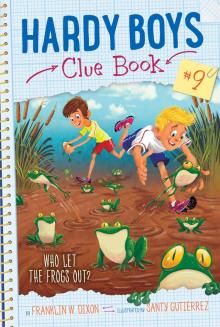 Who Let the Frogs Out?
Who Let the Frogs Out?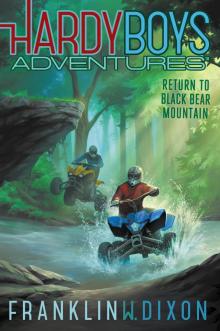 Return to Black Bear Mountain
Return to Black Bear Mountain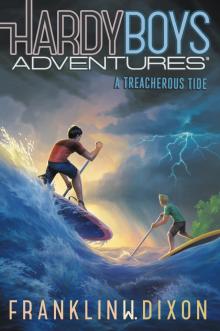 A Treacherous Tide
A Treacherous Tide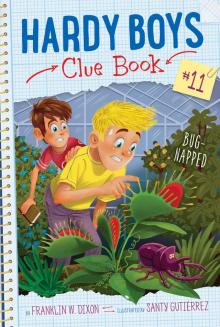 Bug-Napped
Bug-Napped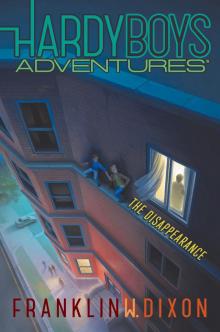 The Disappearance
The Disappearance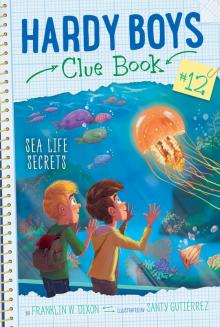 Sea Life Secrets
Sea Life Secrets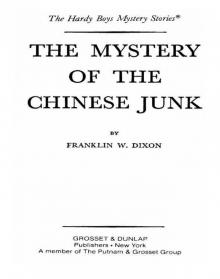 The Mystery of the Chinese Junk
The Mystery of the Chinese Junk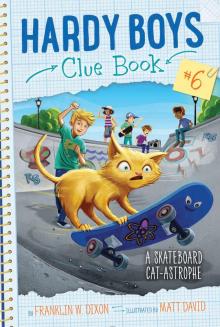 A Skateboard Cat-astrophe
A Skateboard Cat-astrophe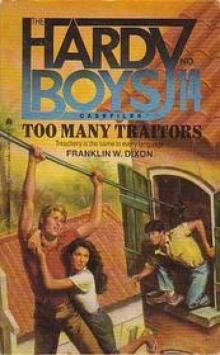 Too Many Traitors
Too Many Traitors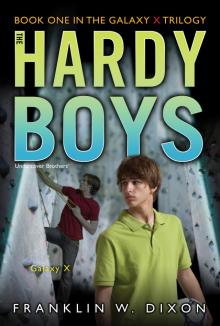 Galaxy X
Galaxy X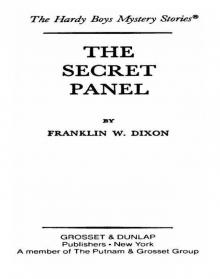 The Secret Panel
The Secret Panel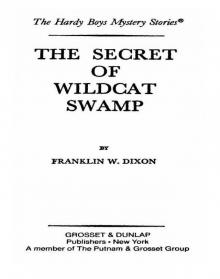 The Secret of Wildcat Swamp
The Secret of Wildcat Swamp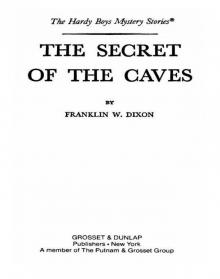 The Secret of the Caves
The Secret of the Caves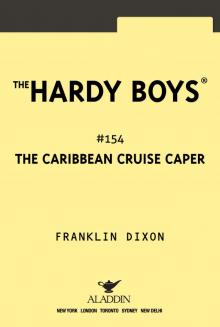 The Caribbean Cruise Caper
The Caribbean Cruise Caper Without a Trace
Without a Trace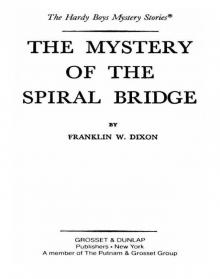 The Mystery of the Spiral Bridge
The Mystery of the Spiral Bridge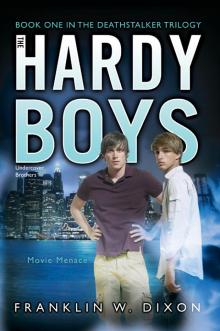 Movie Menace
Movie Menace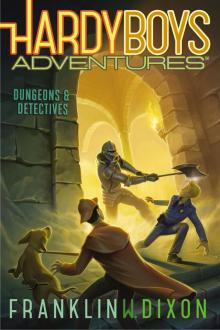 Dungeons & Detectives
Dungeons & Detectives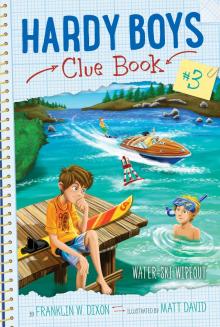 Water-Ski Wipeout
Water-Ski Wipeout The Case of the Psychic's Vision
The Case of the Psychic's Vision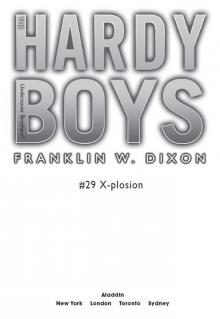 X-plosion
X-plosion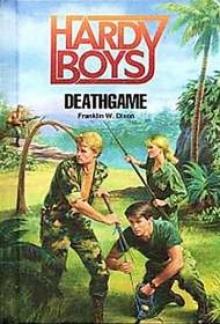 Deathgame
Deathgame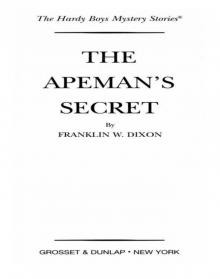 The Apeman's Secret
The Apeman's Secret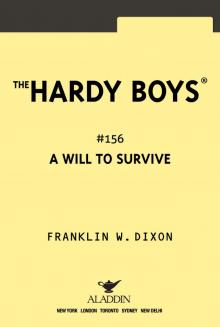 A Will to Survive
A Will to Survive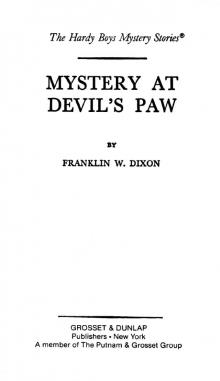 Mystery at Devil's Paw
Mystery at Devil's Paw Blood Money
Blood Money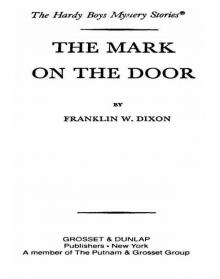 The Mark on the Door
The Mark on the Door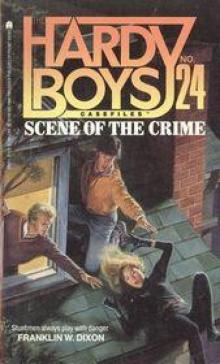 Scene of the Crime
Scene of the Crime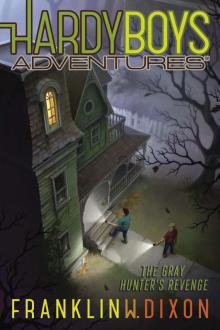 The Gray Hunter's Revenge
The Gray Hunter's Revenge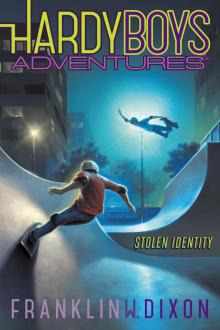 Stolen Identity
Stolen Identity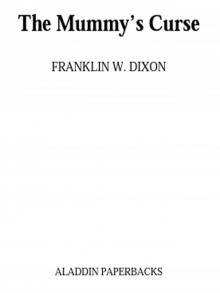 The Mummy's Curse
The Mummy's Curse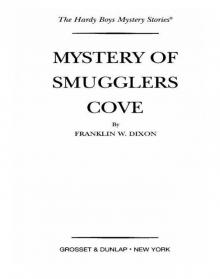 Mystery of Smugglers Cove
Mystery of Smugglers Cove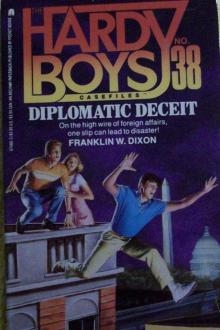 Diplomatic Deceit
Diplomatic Deceit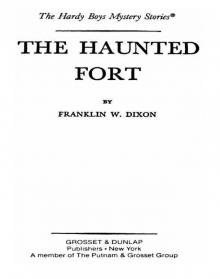 The Haunted Fort
The Haunted Fort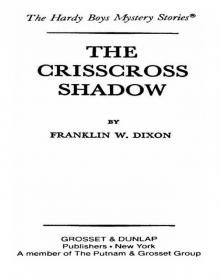 The Crisscross Shadow
The Crisscross Shadow Secret of the Red Arrow
Secret of the Red Arrow Trial and Terror
Trial and Terror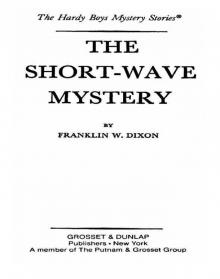 The Short-Wave Mystery
The Short-Wave Mystery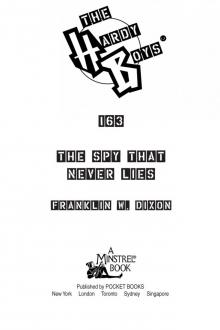 The Spy That Never Lies
The Spy That Never Lies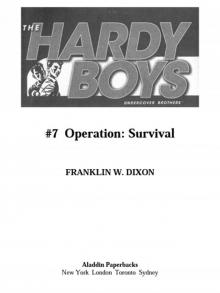 Operation: Survival
Operation: Survival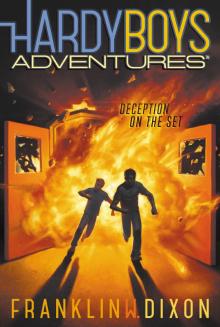 Deception on the Set
Deception on the Set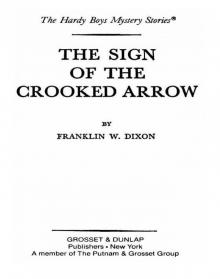 The Sign of the Crooked Arrow
The Sign of the Crooked Arrow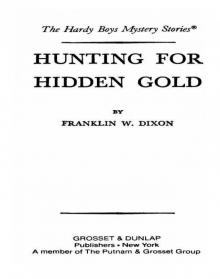 Hunting for Hidden Gold
Hunting for Hidden Gold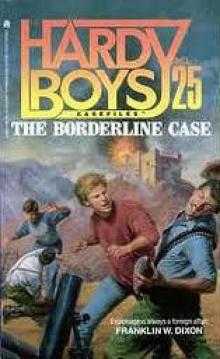 Disaster for Hire
Disaster for Hire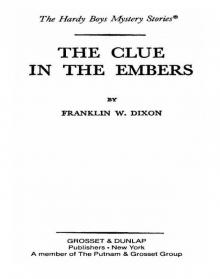 The Clue in the Embers
The Clue in the Embers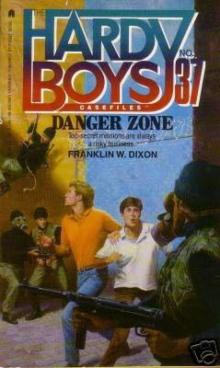 Danger Zone
Danger Zone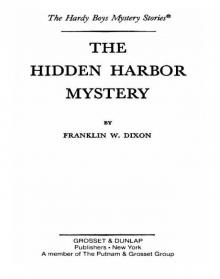 The Hidden Harbor Mystery
The Hidden Harbor Mystery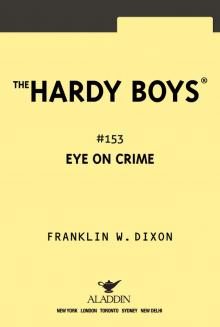 Eye on Crime
Eye on Crime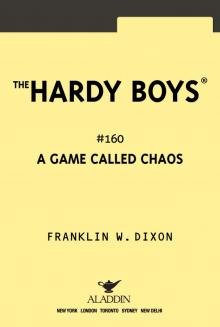 A Game Called Chaos
A Game Called Chaos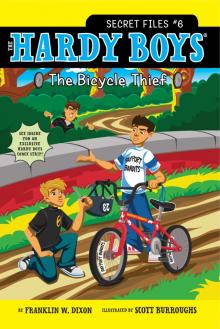 The Bicycle Thief
The Bicycle Thief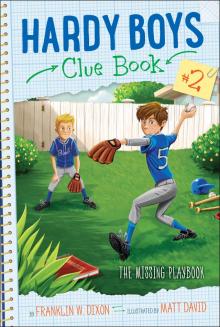 The Missing Playbook
The Missing Playbook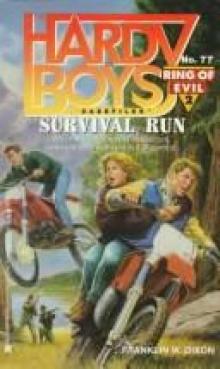 Survival Run
Survival Run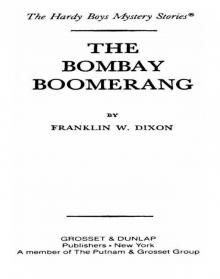 The Bombay Boomerang
The Bombay Boomerang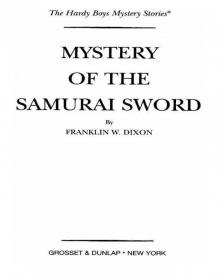 Mystery of the Samurai Sword
Mystery of the Samurai Sword Burned
Burned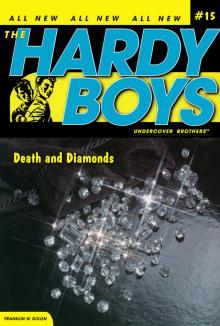 Death and Diamonds
Death and Diamonds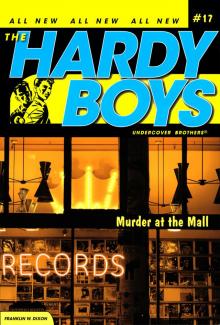 Murder at the Mall
Murder at the Mall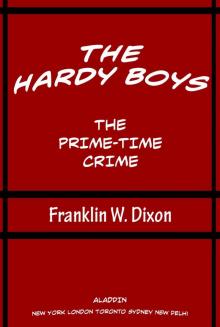 The Prime-Time Crime
The Prime-Time Crime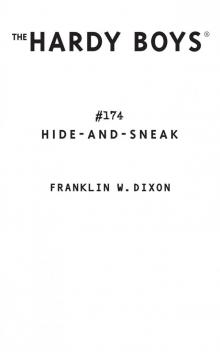 Hide-and-Sneak
Hide-and-Sneak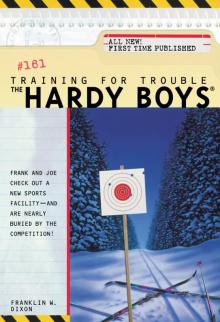 Training for Trouble
Training for Trouble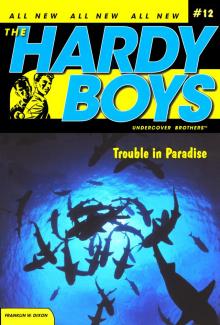 Trouble in Paradise
Trouble in Paradise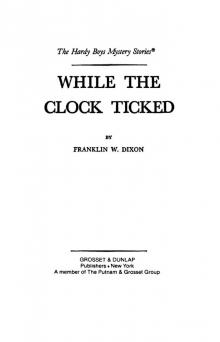 While the Clock Ticked
While the Clock Ticked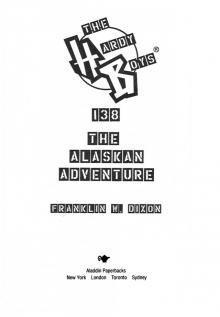 The Alaskan Adventure
The Alaskan Adventure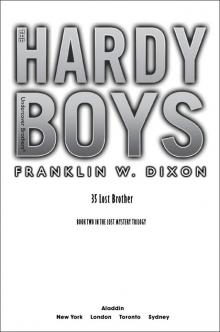 The Lost Brother
The Lost Brother Tunnel of Secrets
Tunnel of Secrets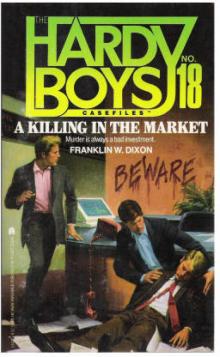 A Killing in the Market
A Killing in the Market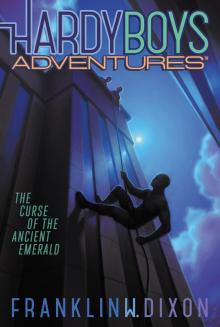 The Curse of the Ancient Emerald
The Curse of the Ancient Emerald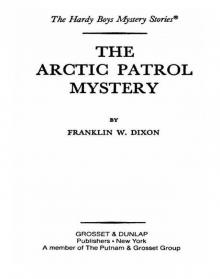 The Arctic Patrol Mystery
The Arctic Patrol Mystery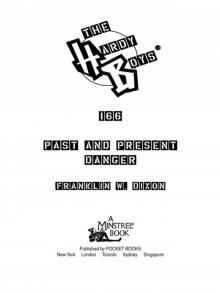 Past and Present Danger
Past and Present Danger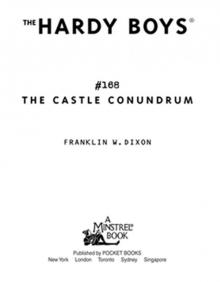 The Castle Conundrum (Hardy Boys)
The Castle Conundrum (Hardy Boys)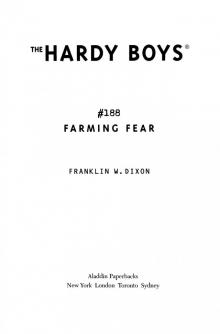 Farming Fear
Farming Fear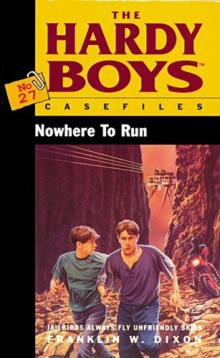 Nowhere to Run
Nowhere to Run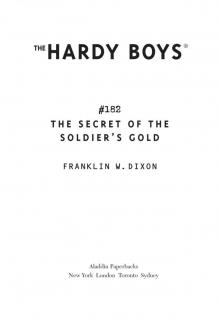 The Secret of the Soldier's Gold
The Secret of the Soldier's Gold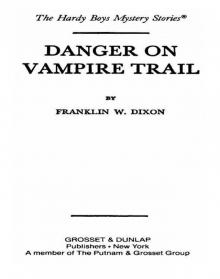 Danger on Vampire Trail
Danger on Vampire Trail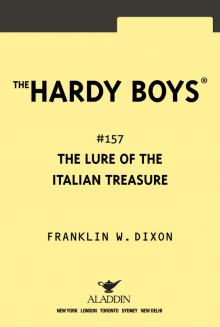 The Lure of the Italian Treasure
The Lure of the Italian Treasure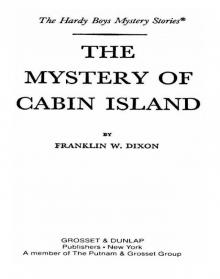 The Mystery of Cabin Island
The Mystery of Cabin Island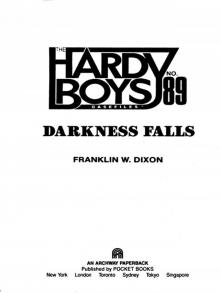 Darkness Falls
Darkness Falls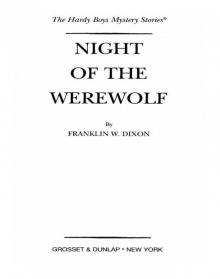 Night of the Werewolf
Night of the Werewolf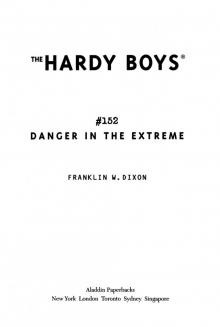 Danger in the Extreme
Danger in the Extreme The Lazarus Plot
The Lazarus Plot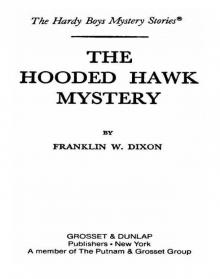 The Hooded Hawk Mystery
The Hooded Hawk Mystery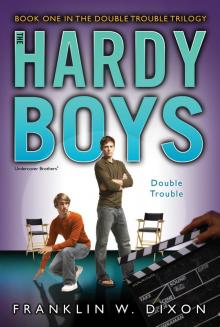 Double Trouble
Double Trouble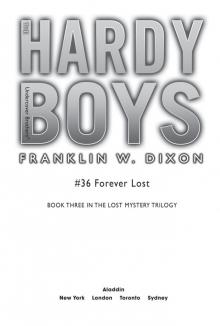 Forever Lost
Forever Lost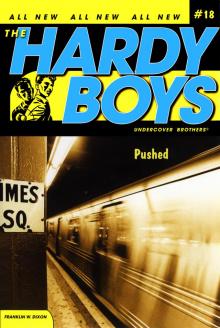 Pushed
Pushed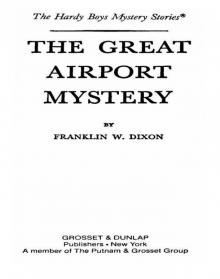 The Great Airport Mystery
The Great Airport Mystery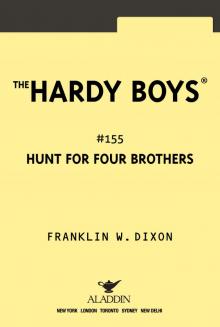 The Hunt for Four Brothers
The Hunt for Four Brothers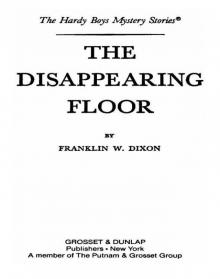 The Disappearing Floor
The Disappearing Floor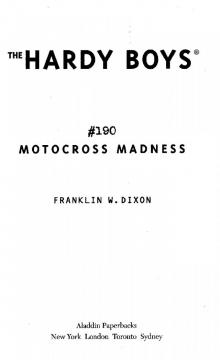 Motocross Madness
Motocross Madness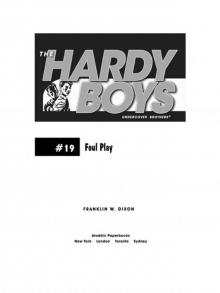 Foul Play
Foul Play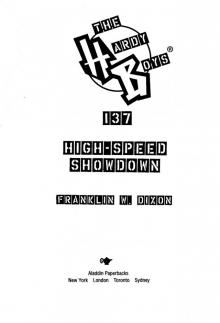 High-Speed Showdown
High-Speed Showdown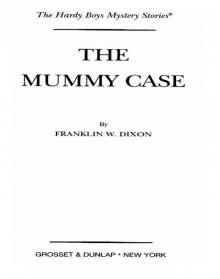 The Mummy Case
The Mummy Case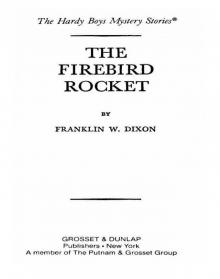 The Firebird Rocket
The Firebird Rocket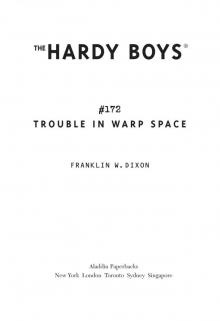 Trouble in Warp Space
Trouble in Warp Space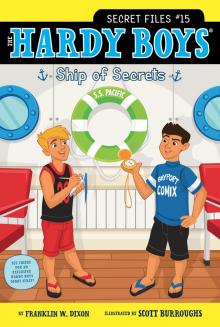 Ship of Secrets
Ship of Secrets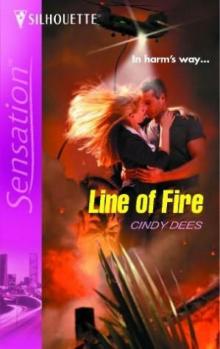 Line of Fire
Line of Fire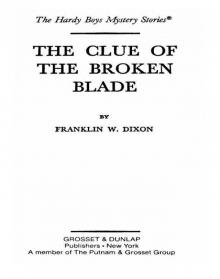 The Clue of the Broken Blade
The Clue of the Broken Blade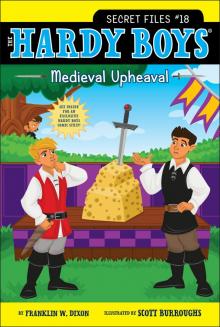 Medieval Upheaval
Medieval Upheaval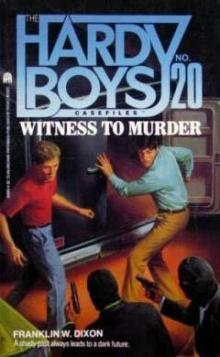 Witness to Murder
Witness to Murder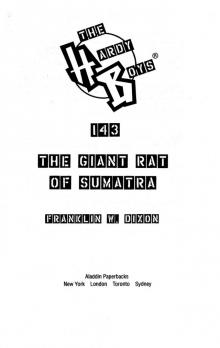 The Giant Rat of Sumatra
The Giant Rat of Sumatra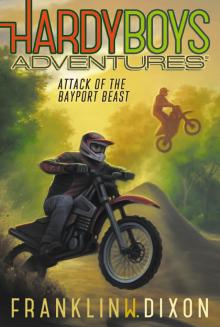 Attack of the Bayport Beast
Attack of the Bayport Beast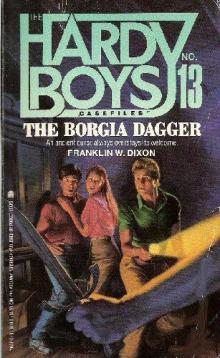 The Borgia Dagger
The Borgia Dagger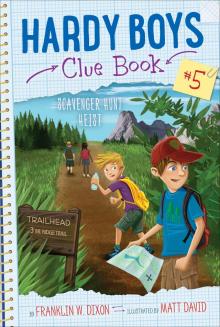 Scavenger Hunt Heist
Scavenger Hunt Heist No Way Out
No Way Out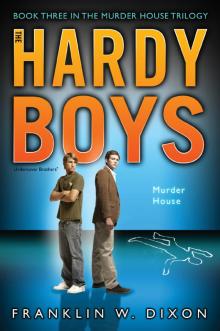 Murder House
Murder House The X-Factor
The X-Factor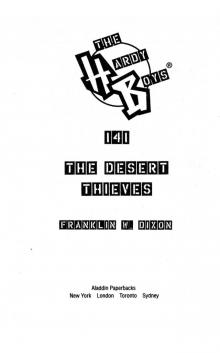 The Desert Thieves
The Desert Thieves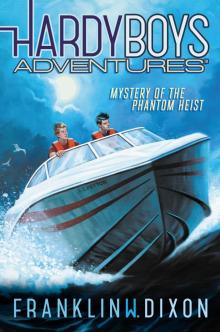 Mystery of the Phantom Heist
Mystery of the Phantom Heist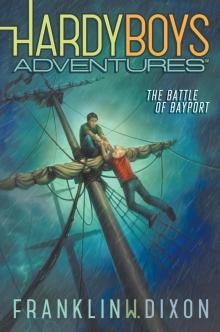 The Battle of Bayport
The Battle of Bayport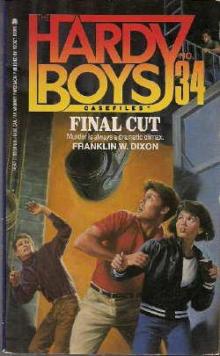 Final Cut
Final Cut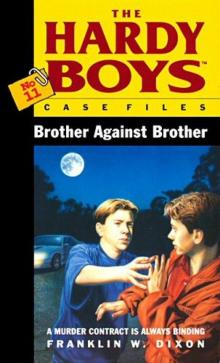 Brother Against Brother
Brother Against Brother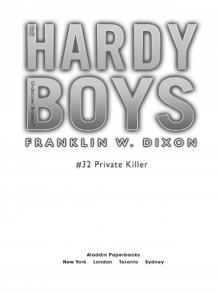 Private Killer
Private Killer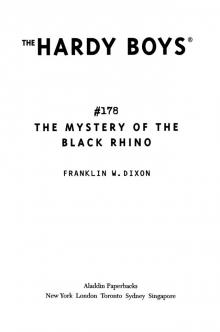 The Mystery of the Black Rhino
The Mystery of the Black Rhino Feeding Frenzy
Feeding Frenzy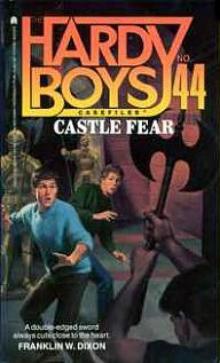 Castle Fear
Castle Fear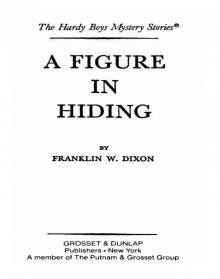 A Figure in Hiding
A Figure in Hiding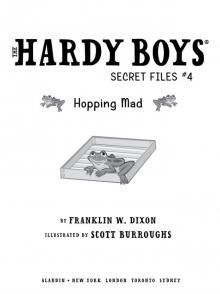 Hopping Mad
Hopping Mad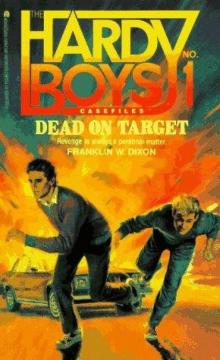 Dead on Target
Dead on Target Skin and Bones
Skin and Bones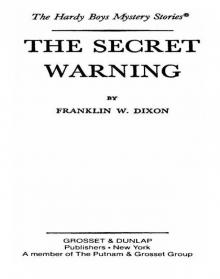 The Secret Warning
The Secret Warning Flesh and Blood
Flesh and Blood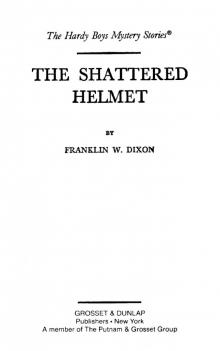 The Shattered Helmet
The Shattered Helmet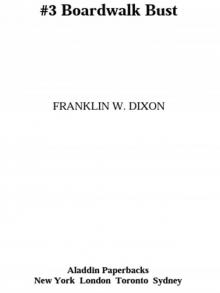 Boardwalk Bust
Boardwalk Bust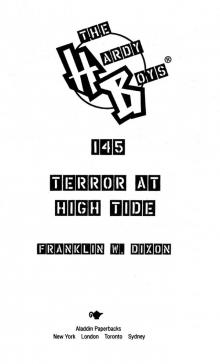 Terror at High Tide
Terror at High Tide In Plane Sight
In Plane Sight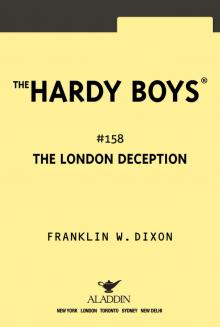 The London Deception
The London Deception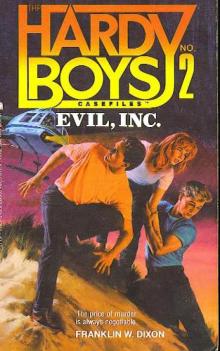 Evil, Inc.
Evil, Inc.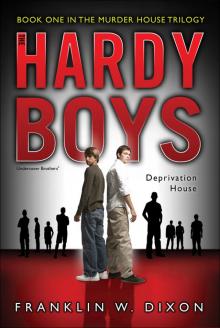 Deprivation House
Deprivation House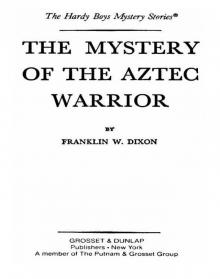 The Mystery of the Aztec Warrior
The Mystery of the Aztec Warrior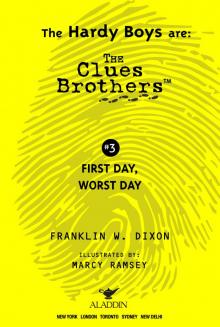 First Day, Worst Day
First Day, Worst Day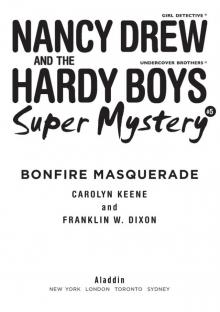 Bonfire Masquerade
Bonfire Masquerade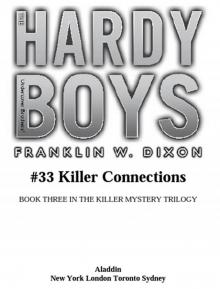 Killer Connections
Killer Connections Strategic Moves
Strategic Moves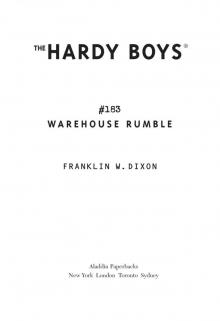 Warehouse Rumble
Warehouse Rumble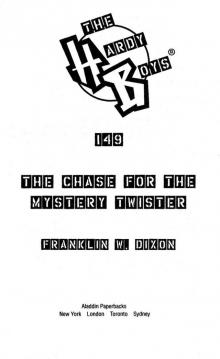 The Chase for the Mystery Twister
The Chase for the Mystery Twister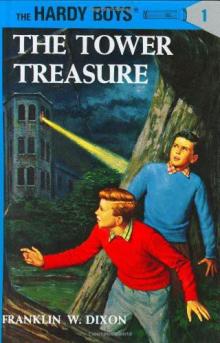 The Tower Treasure thb-1
The Tower Treasure thb-1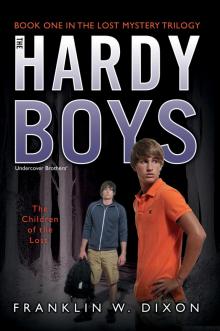 The Children of the Lost
The Children of the Lost The Last Laugh
The Last Laugh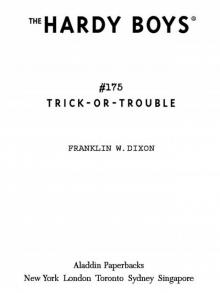 Trick-or-Trouble
Trick-or-Trouble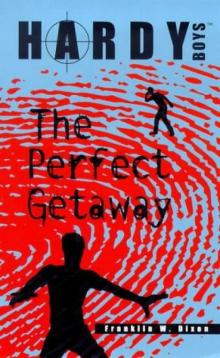 Perfect Getaway
Perfect Getaway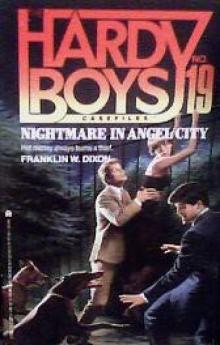 Nightmare in Angel City
Nightmare in Angel City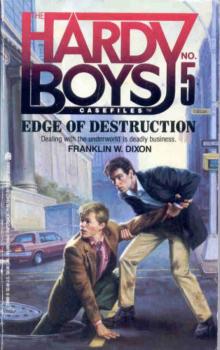 Edge of Destruction
Edge of Destruction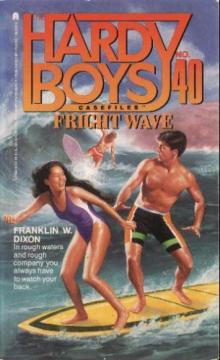 Fright Wave
Fright Wave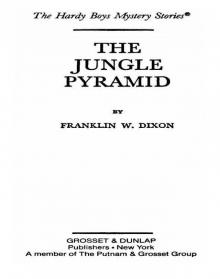 The Jungle Pyramid
The Jungle Pyramid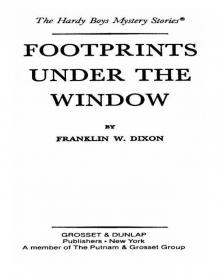 Footprints Under the Window
Footprints Under the Window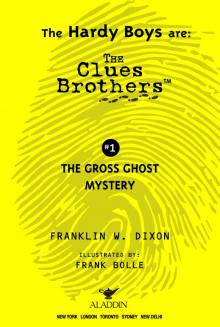 The Gross Ghost Mystery
The Gross Ghost Mystery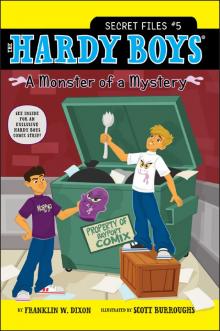 A Monster of a Mystery
A Monster of a Mystery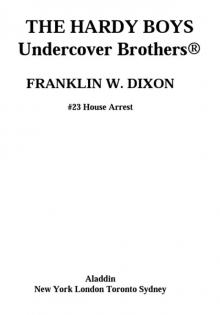 House Arrest
House Arrest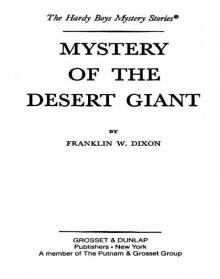 Mystery of the Desert Giant
Mystery of the Desert Giant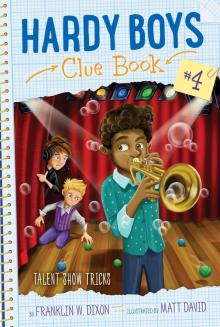 Talent Show Tricks
Talent Show Tricks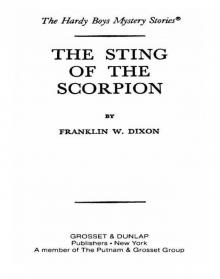 The Sting of the Scorpion
The Sting of the Scorpion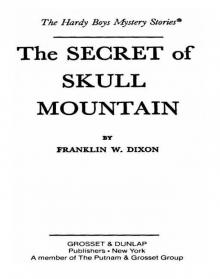 The Secret of Skull Mountain
The Secret of Skull Mountain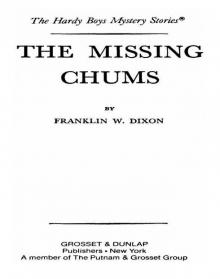 The Missing Chums
The Missing Chums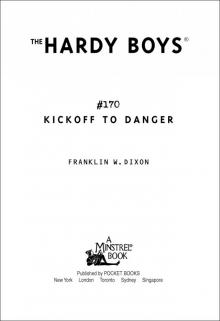 Kickoff to Danger
Kickoff to Danger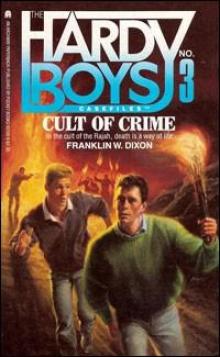 Cult of Crime
Cult of Crime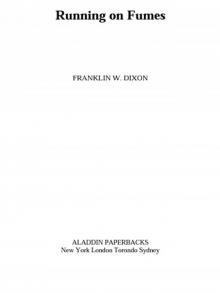 Running on Fumes
Running on Fumes Martial Law
Martial Law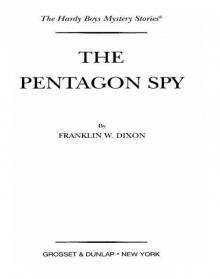 The Pentagon Spy
The Pentagon Spy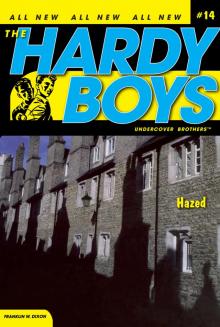 Hazed
Hazed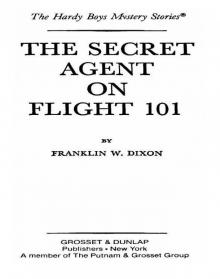 The Secret Agent on Flight 101
The Secret Agent on Flight 101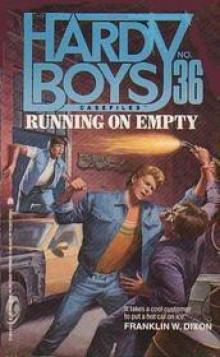 Running on Empty
Running on Empty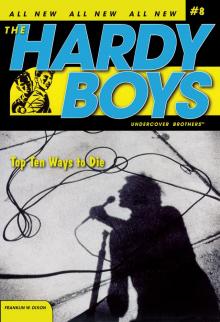 Top Ten Ways to Die
Top Ten Ways to Die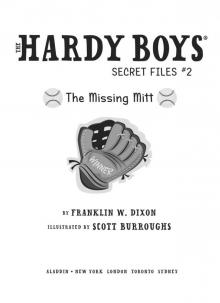 The Missing Mitt
The Missing Mitt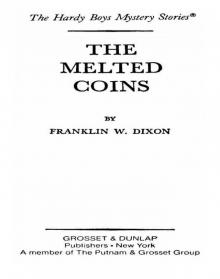 The Melted Coins
The Melted Coins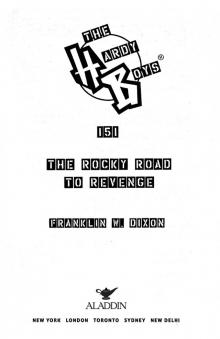 The Rocky Road to Revenge
The Rocky Road to Revenge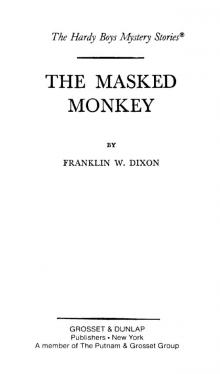 The Masked Monkey
The Masked Monkey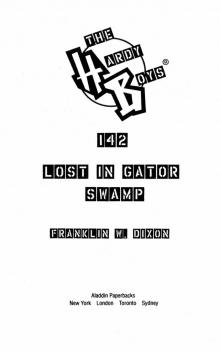 Lost in Gator Swamp
Lost in Gator Swamp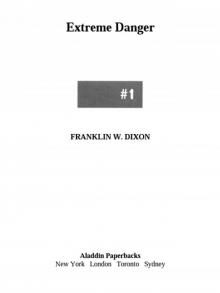 Extreme Danger
Extreme Danger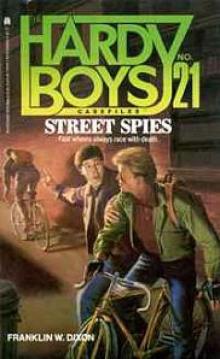 Street Spies
Street Spies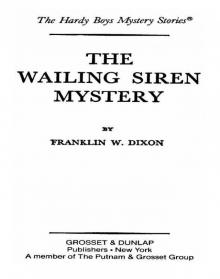 The Wailing Siren Mystery
The Wailing Siren Mystery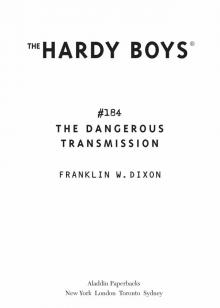 The Dangerous Transmission
The Dangerous Transmission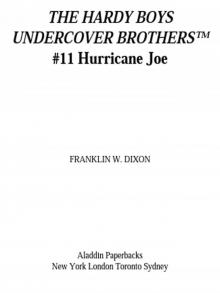 Hurricane Joe
Hurricane Joe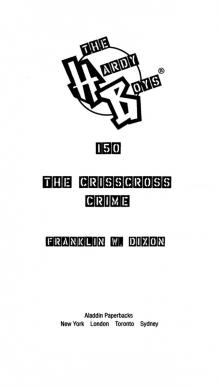 The Crisscross Crime
The Crisscross Crime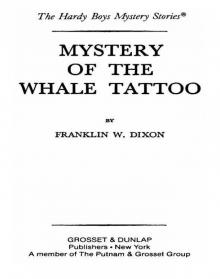 Mystery of the Whale Tattoo
Mystery of the Whale Tattoo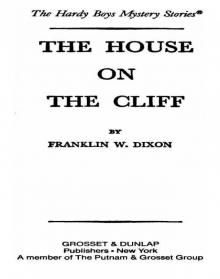 The House on the Cliff
The House on the Cliff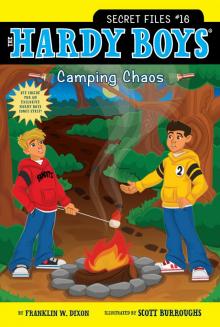 Camping Chaos
Camping Chaos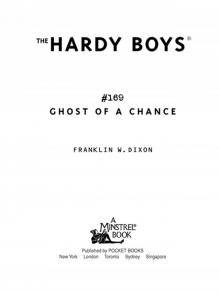 Ghost of a Chance
Ghost of a Chance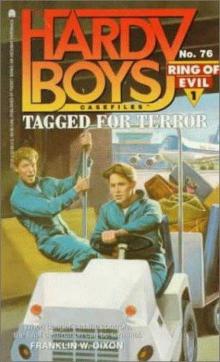 Tagged for Terror
Tagged for Terror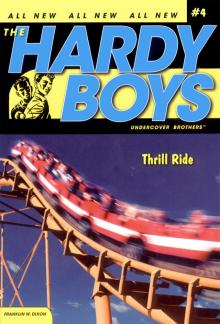 Thrill Ride
Thrill Ride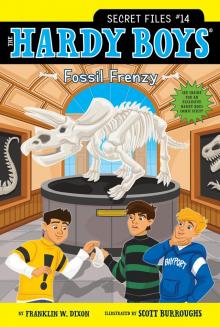 Fossil Frenzy
Fossil Frenzy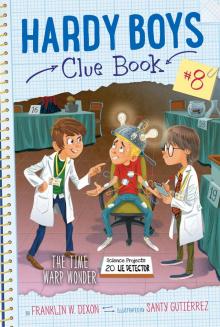 The Time Warp Wonder
The Time Warp Wonder Ghost Stories
Ghost Stories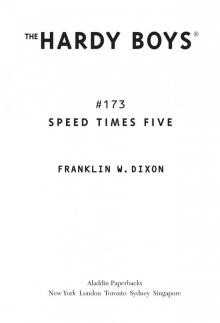 Speed Times Five
Speed Times Five What Happened at Midnight
What Happened at Midnight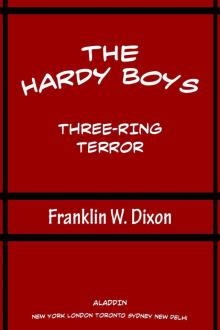 Three-Ring Terror
Three-Ring Terror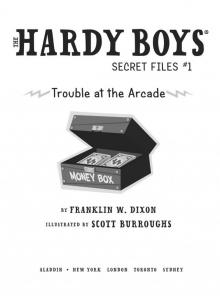 Trouble at the Arcade
Trouble at the Arcade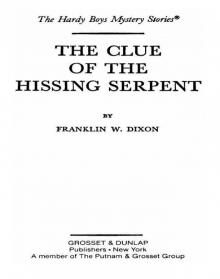 The Clue of the Hissing Serpent
The Clue of the Hissing Serpent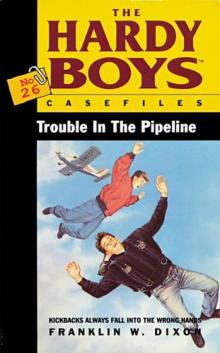 Trouble in the Pipeline
Trouble in the Pipeline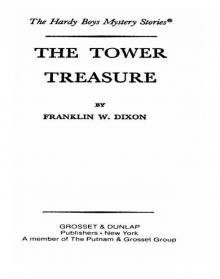 The Tower Treasure
The Tower Treasure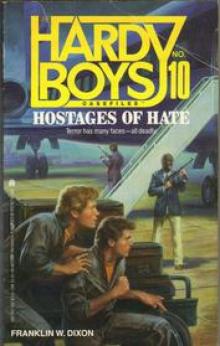 Hostages of Hate
Hostages of Hate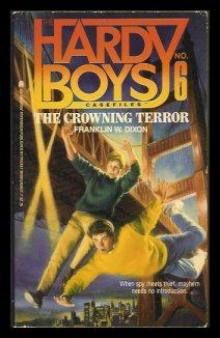 The Crowning Terror
The Crowning Terror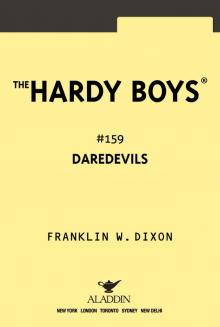 Daredevils
Daredevils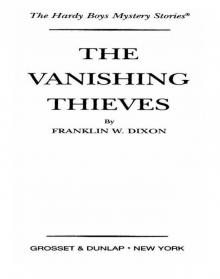 The Vanishing Thieves
The Vanishing Thieves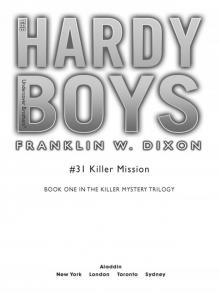 Killer Mission
Killer Mission The Mark of the Blue Tattoo
The Mark of the Blue Tattoo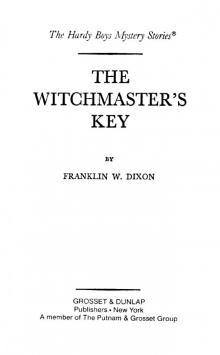 The Witchmaster's Key
The Witchmaster's Key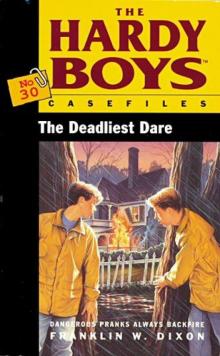 The Deadliest Dare
The Deadliest Dare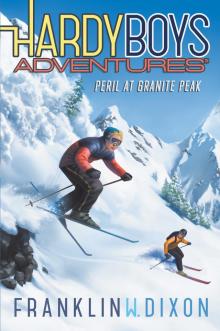 Peril at Granite Peak
Peril at Granite Peak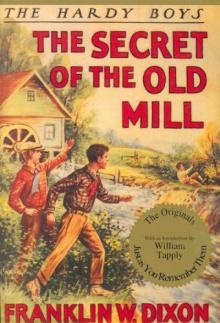 The Secret Of The Old Mill thb-3
The Secret Of The Old Mill thb-3 Rocky Road
Rocky Road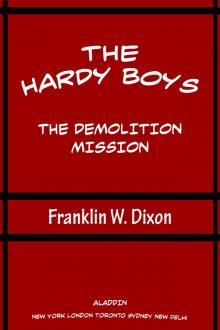 The Demolition Mission
The Demolition Mission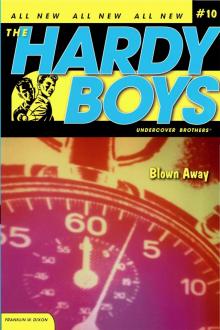 Blown Away
Blown Away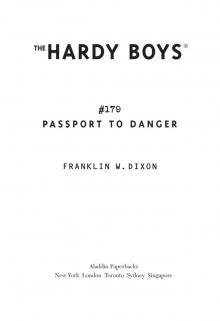 Passport to Danger
Passport to Danger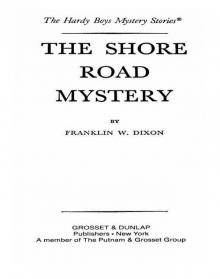 The Shore Road Mystery
The Shore Road Mystery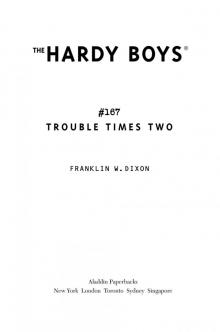 Trouble Times Two
Trouble Times Two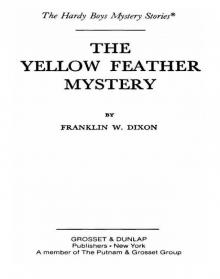 The Yellow Feather Mystery
The Yellow Feather Mystery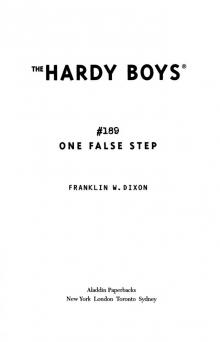 One False Step
One False Step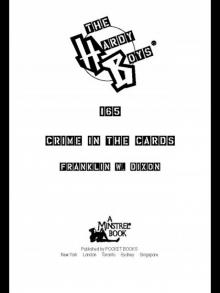 Crime in the Cards
Crime in the Cards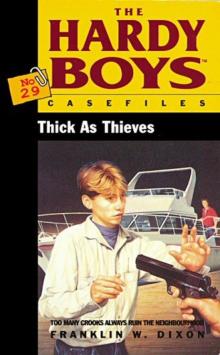 Thick as Thieves
Thick as Thieves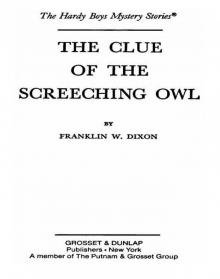 The Clue of the Screeching Owl
The Clue of the Screeching Owl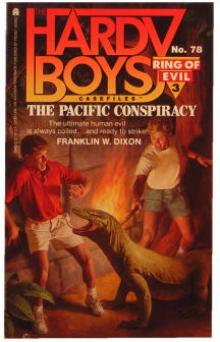 The Pacific Conspiracy
The Pacific Conspiracy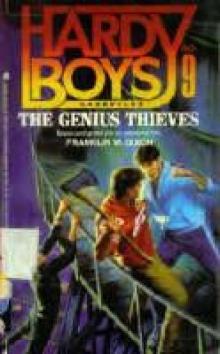 The Genius Thieves
The Genius Thieves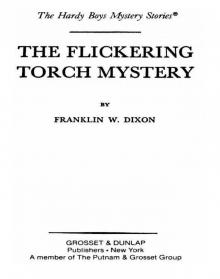 The Flickering Torch Mystery
The Flickering Torch Mystery Into Thin Air
Into Thin Air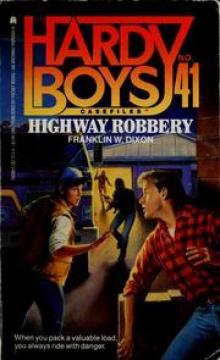 Highway Robbery
Highway Robbery Deadfall
Deadfall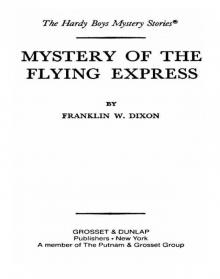 Mystery of the Flying Express
Mystery of the Flying Express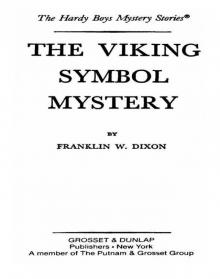 The Viking Symbol Mystery
The Viking Symbol Mystery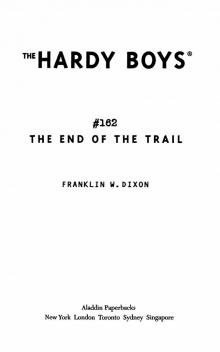 The End of the Trail
The End of the Trail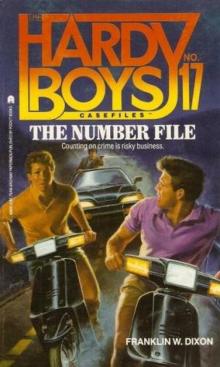 The Number File
The Number File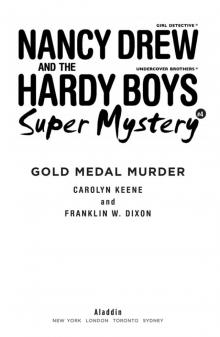 Gold Medal Murder
Gold Medal Murder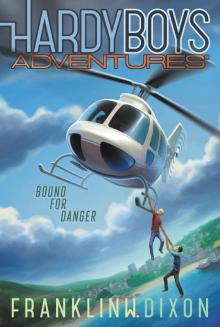 Bound for Danger
Bound for Danger Collision Course
Collision Course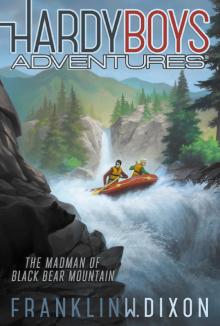 The Madman of Black Bear Mountain
The Madman of Black Bear Mountain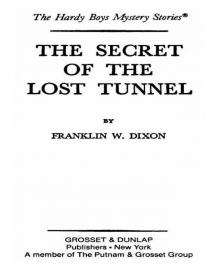 The Secret of the Lost Tunnel
The Secret of the Lost Tunnel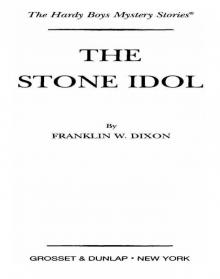 The Stone Idol
The Stone Idol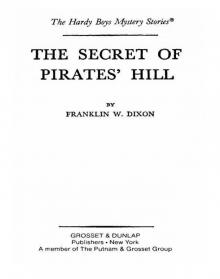 The Secret of Pirates' Hill
The Secret of Pirates' Hill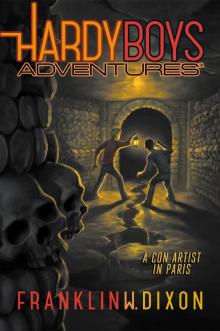 A Con Artist in Paris
A Con Artist in Paris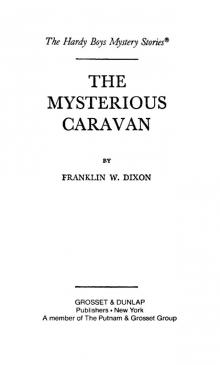 The Mysterious Caravan
The Mysterious Caravan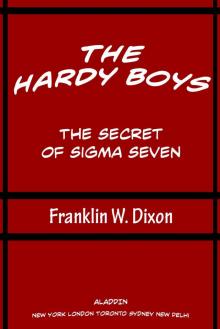 The Secret of Sigma Seven
The Secret of Sigma Seven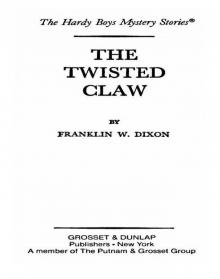 The Twisted Claw
The Twisted Claw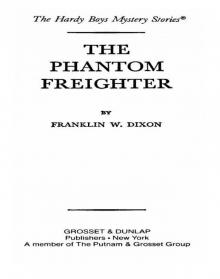 The Phantom Freighter
The Phantom Freighter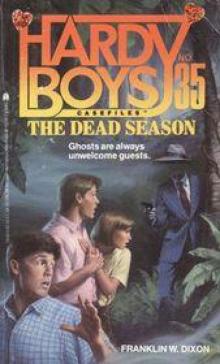 The Dead Season
The Dead Season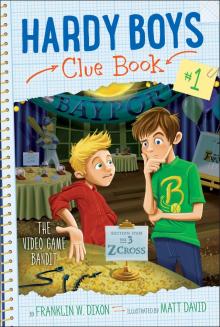 The Video Game Bandit
The Video Game Bandit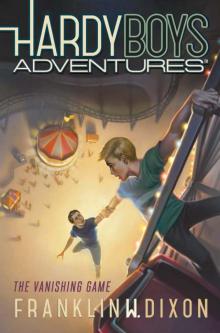 The Vanishing Game
The Vanishing Game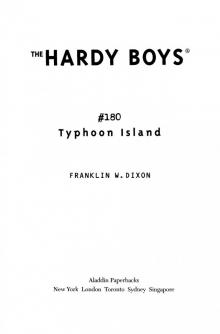 Typhoon Island
Typhoon Island